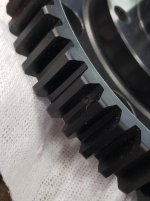This is a cam gear...hardened steel (don't know how hard or material).
I want to drill a 1/16" hole in the tooth land. The hole needs to go down .150", then it breaks through the other side which is what I want, i.e. create a through hole. I bought some 1/16" carbide end mills from McMaster Carr, and also a carbide drill bit.
The end mill worked....I could feel some variation in hardness as I went down. But, when it hits the last .010" or so, the end mill really doesn't like it (I assume due to the skin of the gear being harder) and pretty much breaks apart.
The twist drill bit didn't do any better, in fact it didn't even like starting the hole and I gave up on that before I broke it off.
So my question is...would a coated carbide end mill fare any better (I guess it wouldn't but...)? Is there a number of flutes that is best (I used a 4 flute but can get 2 or 3 flutes)?
I tried flooding with cutting oil, LP3, etc. and that didn't seem to hurt, or help. I also tried a slow/steady quill feed (by hand) and also tried locking the quill and slowly creeping up on the table (Z) but no big difference...the carbide end mill just doesn't seem 'tough' enough to cut the steel. The setup is plenty rigid, but at some point I can put enough force that the tool breaks...or if I go easier on feed, it never cuts.

I want to drill a 1/16" hole in the tooth land. The hole needs to go down .150", then it breaks through the other side which is what I want, i.e. create a through hole. I bought some 1/16" carbide end mills from McMaster Carr, and also a carbide drill bit.
The end mill worked....I could feel some variation in hardness as I went down. But, when it hits the last .010" or so, the end mill really doesn't like it (I assume due to the skin of the gear being harder) and pretty much breaks apart.
The twist drill bit didn't do any better, in fact it didn't even like starting the hole and I gave up on that before I broke it off.
So my question is...would a coated carbide end mill fare any better (I guess it wouldn't but...)? Is there a number of flutes that is best (I used a 4 flute but can get 2 or 3 flutes)?
I tried flooding with cutting oil, LP3, etc. and that didn't seem to hurt, or help. I also tried a slow/steady quill feed (by hand) and also tried locking the quill and slowly creeping up on the table (Z) but no big difference...the carbide end mill just doesn't seem 'tough' enough to cut the steel. The setup is plenty rigid, but at some point I can put enough force that the tool breaks...or if I go easier on feed, it never cuts.


